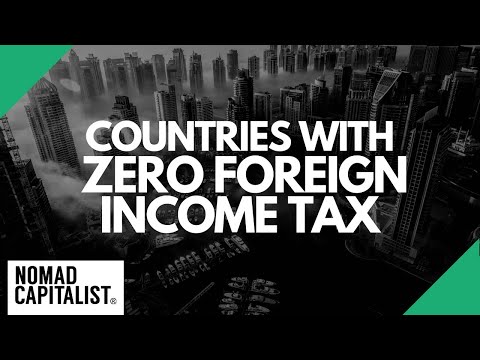How The Global Minimum Tax Deal Will Affect Digital Nomads
October 17, 2022

The Organization for Economic Co-operation and Development (OECD) and the Group of 20 economic powers (G20) recently announced that 137 countries had signed economic cooperation on setting a global minimum corporate tax rate.
The global tax agreement was to solve the challenges brought by the digitalization of the economy. The goal of setting a global minimum tax rate is to standardize and even out the playing field as more and more multinational companies shift to a borderless way of doing business. The countries that signed the accord make up more than 90 percent of the worldwide economy. The OECD believes the global tax deal can generate upwards of €140B in additional global taxes.
Here’s a quick rundown on global minimum tax, why countries decided to standardize international tax, and how it will affect digital nomads.
What is a global minimum tax rate?
Putting a global minimum tax rate in place provides a standard for countries to follow. It also aims to reduce tax competition. The international agreement on a global minimum corporate tax rate, in theory, will end the tax competition between governments by evening out the playing field. Low-tax jurisdictions do so to attract foreign investment.
A global minimum corporate tax is the tax policy imposed on multinational corporations. Individual countries determine their tax rate following international agreements. The OECD proposal believes that adopting a global minimum tax rate will help regulate big corporations that have worldwide operations in two ways.
First, it will discourage multinational corporations from making foreign investments based on low taxes. And second, it will prevent companies from shifting their profits or making foreign investments in lower-tax countries. No matter how much profit they make in that country.
Why a global minimum tax deal?

The covid pandemic hastened the global minimum tax deal. With government budgets strained, many countries need the additional global tax revenues to pump up their local economy. The tax agreement will discourage large multinationals from shifting profit and tax revenues to low-tax jurisdictions, regardless of where they made their income.
Income from intangible assets like patents, licensing, brand equity, and intellectual property are usually moved to low-tax countries. This profit-shifting strategy is a standard practice among large firms to avoid paying higher taxes in their home country of operation.
How would a global minimum tax deal work?
The global minimum tax deal works like an international tax rule. Countries that signed the international tax agreement must abide by the terms of an effective tax rate for multinational enterprises that earn revenue from overseas operations and sales. These tax treaties are essential in determining where companies pay taxes and which jurisdiction collects what.
The OECD’s Two-Pillar solution
OECD’s Inclusive Framework on Base Erosion and Profit Shifting (IF) is a two-prong approach. The ‘two pillars’ seek to change where large multinational enterprises pay their taxes and set a global minimum corporate tax rate that countries must abide by.
Pillar One is a streamlined system to be adopted by countries so that multinational firms would not have to deal with multiple approaches depending on the country they want to do business in.
Pillar Two adoption is on an optional basis. It is also more of a template than a requirement for various jurisdictions to adopt. If enough countries would agree on Pillar Two, then multinational companies would have to burden a 15 percent effective tax rate across the globe, regardless of where they operate
The First Pillar
Pillar One outlines who will be taxed and how they are taxed. Multinational enterprises with revenue greater than €20B and at least 10 percent profitability will be taxed with “Amount A.” 25 percent of income above the 10 percent margin will be taxed to jurisdictions or countries where they have sales. After a review period of 7 years, the €20B threshold will shrink in half, for a total of €10B.
A physical presence rule or nexus determines if a country qualifies for the Amount A allocation. When large companies record gains of at least €1M in revenue, “Amount A” is enforced. For countries with a GDP lower than €40B, nexus will be set at €250,000.
Pillar One also identifies safe harbor and eliminates double taxation. Profit earned in a country will be relieved using either the exemption or credit method. However, multinational corporations will incur tax liability for residual profit.
Moreover, countries have agreed to remove digital services taxes and similar legislation concerning global firms. And even further commit not to introduce such laws in the future.
The Second Pillar
Pillar two highlights the global minimum tax. This Pillar sets a global minimum tax rate of 15 percent for multinational companies earning more than €750M in revenue.
Included in this framework is a domestic minimum tax rule. The domestic minimum tax gives countries the taxing rights to claim the first right to tax corporate earnings that fall below the minimum effective rate of 15 percent.
An Income Inclusion Rule (IRR) is also included in Pillar Two. The IRR will dictate if the foreign income of a company will be included in the parent company’s taxable income. Any taxable income above 15 percent would be payable to the company’s home jurisdiction.
Furthermore, the IRR will only apply to foreign tax revenue after deducting 8 percent of tangible assets and 10 percent of payroll costs. Both will be reduced to 5 percent each after a 10-year transition period.
Pillar Two also drafts the Undertaxed Payment Rule (UTPR). The UTPR allows any country to increase taxes on a global corporation if another one of its related entities located in a different country is being taxed below the 15 percent effective rate. If all countries where a corporation operates apply the same top-up tax, the taxable profit will be based on the physical location of tangible assets and employees.
These three rules:
- Domestic minimum tax,
- The income inclusion rule
- The undertaxed payment rule works together to set the global minimum tax rate.
The global minimum tax will be the basis for collecting tax revenue from multinational companies investing abroad and foreign companies investing domestically. All three rules are in sync with the minimum effective tax based on the 15 percent rate. It also applies to each country in which a firm operates.
How will the global minimum tax affect Digital Nomads

Once enacted, the global minimum tax deal will drastically change the existing international tax rules. There will be a general increase in tax costs for cross-border investment. It will significantly impact important corporate decisions like where to hire, where to operate, and where to invest in the world.
Economists predict giant corporations will move their capital back to their home countries and boost those economies. The global minimum tax deal has put deductions and exemptions to cushion the impact on low-tax jurisdictions.
The United States currently imposes a 21 percent tax rate on U.S. multinationals. Large corporations will be disincentivized from offshoring their business with the proposed global minimum tax rate of 15 percent.
Furthermore, the global tax deal will allow the U.S. government to collect additional taxes that American corporations don’t pay in low-tax jurisdictions. So, if an American company pays only 10 percent tax in a different country, the U.S. can claim the remaining 5 percent tax.
Implementation of the Global Minimum Tax Deal
If the timeline is strictly followed, the global tax agreement will take effect as early as 2023.
It is important to note that the global tax deal is not self-implementing. Countries that signed the tax treaty would have to pass a local legislature to accommodate the deal into their respective tax system.
Mid-last year, the Biden administration welcomed the fast-tracking of the new rules on global taxes. The President commends the effort stating it will make the U.S. more competitive against other countries. However, the U.S. Tax Rules were made significantly more complex by the Build Back Better proposal. One hurdle for the Biden administration to successfully adopt the global tax agreement is simplifying the current rules for large multinational companies.
With a very tight deadline, the global tax deal must be hastened into laws for each country if it hopes to abide by its 2023 deadline.
Which countries have minimum tax?

Several countries offer low tax policies to attract investors to their shores. These are opportunities for high-net and ultra-high net worth nomads like you, options for where to place foreign investments. Besides Europe, some countries in the Americas, the Middle East, and Asia also offer low to zero tax policies.
European Union
Digital nomads can enjoy living in 11 low-tax countries in Europe. Though paying zero income tax will be difficult, it is possible to pursue a nomadic lifestyle in Europe or set up a base and live there full time. All while paying minimal income tax. Excellent tax planning, citizenship strategy, and choosing the correct investment should be considered when selecting which European country with favorable tax rates will best fit your desired lifestyle.
The Americas
If you want to look beyond Europe when looking for tax haven countries, the Caribbean Islands would be the first place that might pop into your head.
Some of the reasons why the Caribbean Islands are on the top of the list are:
- Immigration and the path to naturalization are deeply ingrained in their culture. And thus, a relatively straightforward process.
- Low cost of living.
- Tropical weather and laidback lifestyle are magnets for nomads and expats.
- Some Caribbean Islands like the Cayman Islands are still under British Overseas Territories, so you can expect first-class infrastructure. Even more, these countries provide services in health, education, and legal comparable to other jurisdictions in Europe.
Because of the many citizenship options, competitive real estate, and friendly tax schemes, it can be overwhelming. Some strategic planning with experts will help you navigate all the tax rules and maximize the tax incentives and citizenship programs these countries offer.
Asia and The Middle East
Though there are just a handful of tax-friendly countries in Asia, there are hidden gems within this region that savvy nomads should know about.
Middle East countries like Saudi Arabia, Bahrain, Kuwait, Abu Dhabi, and Dubai have zero tax policies. They want to incentivize entrepreneurship or are wealthy enough that they do not need income tax revenue. These countries have well-developed infrastructure and high standards of living. The only question is if the country and culture will fit the nomad lifestyle that you want.
Some Southeast Asian countries also have various tax-friendly schemes to attract foreign investors. Countries like Brunei, Hong Kong, Malaysia, Singapore, and the Philippines are a favorite for nomads and expats. These low-tax jurisdictions offer some form of a zero income tax or a territorial tax.
Because of a wide selection of programs, creating a master plan suited to your preferred lifestyle is a must. A holistic strategy will ensure you get the right experts and connections to make the most of the zero to low-income tax schemes that Asian countries offer.
Safest low-tax countries in the world
If you are someone who worries a lot about violence in your home country, there are safe places in the world where you can enjoy life and live it to the fullest.
From countries in Europe, The Americas, Asia, and the Middle East, Nomad Capitalist lists the top 15 low-tax countries that are the safest to live and invest in. These countries not only boast of low crime rates. In addition, some are havens for high-net-worth families who want to maximize tax incentives and enjoy a more laidback lifestyle.
If you want to pursue global citizenship with your spouse or family, you’ve got to put safety on top of your priority list.
Countries on this list include:
-
Monaco
-
Andorra
-
Switzerland
-
Portugal
-
Georgia
-
Qatar
-
United Arab Emirates
-
Singapore
-
Colombia
-
Honduras
-
Chile
-
Paraguay
-
Uruguay
-
Ecuador
-
Costa Rica
Escape High Taxes LEGALLY
Living in a low-tax country means you can afford a more luxurious lifestyle. There is nothing unethical about wanting to keep more of your hard-earned money to yourself or your family. Shifting profits, offshoring, and foreign investing are just means for high-net-worth individuals to maximize the tax policies to their benefit.
Contact us if you want to know more about how the global minimum tax deal can affect your nomadic lifestyle. Our team of worldwide experts and network can help you legally avoid paying a high tax burden, maximize your foreign profits and live a lifestyle of financial wealth and freedom.


Does Puerto Rico Pay Taxes to the US?
It’s a common question and one that often fuels confusion, debate, and a fair share of misinformation – Do residents of Puerto Rico actually pay US federal taxes? When most people think of US tax obligations, they naturally assume they apply uniformly across all US citizens. But when it comes to Puerto Rico, things are […]
Read more

Zug Canton Taxes: The Ultimate Destination for Wealth Management in Switzerland
Switzerland’s global reputation is built not just on stunning views of Alpine peaks and serene lakes but also on a foundation of exceptional quality of life, world-class infrastructure and investor-friendly tax policies. The results speak for themselves: efficient public transport seamlessly links cities and villages; the standard of living regularly ranks among the highest in […]
Read more

How Smart Investors Use Venture Capital to Build Wealth
Big companies like Google, Amazon, Facebook and Apple all started out as bold ideas backed by venture capital. Decades later, the same firms are household names, as familiar to most people as electricity, the internet, or the telephone. But hindsight is a fickle friend. The truth is, it wasn’t always so obvious they’d succeed. These […]
Read more






